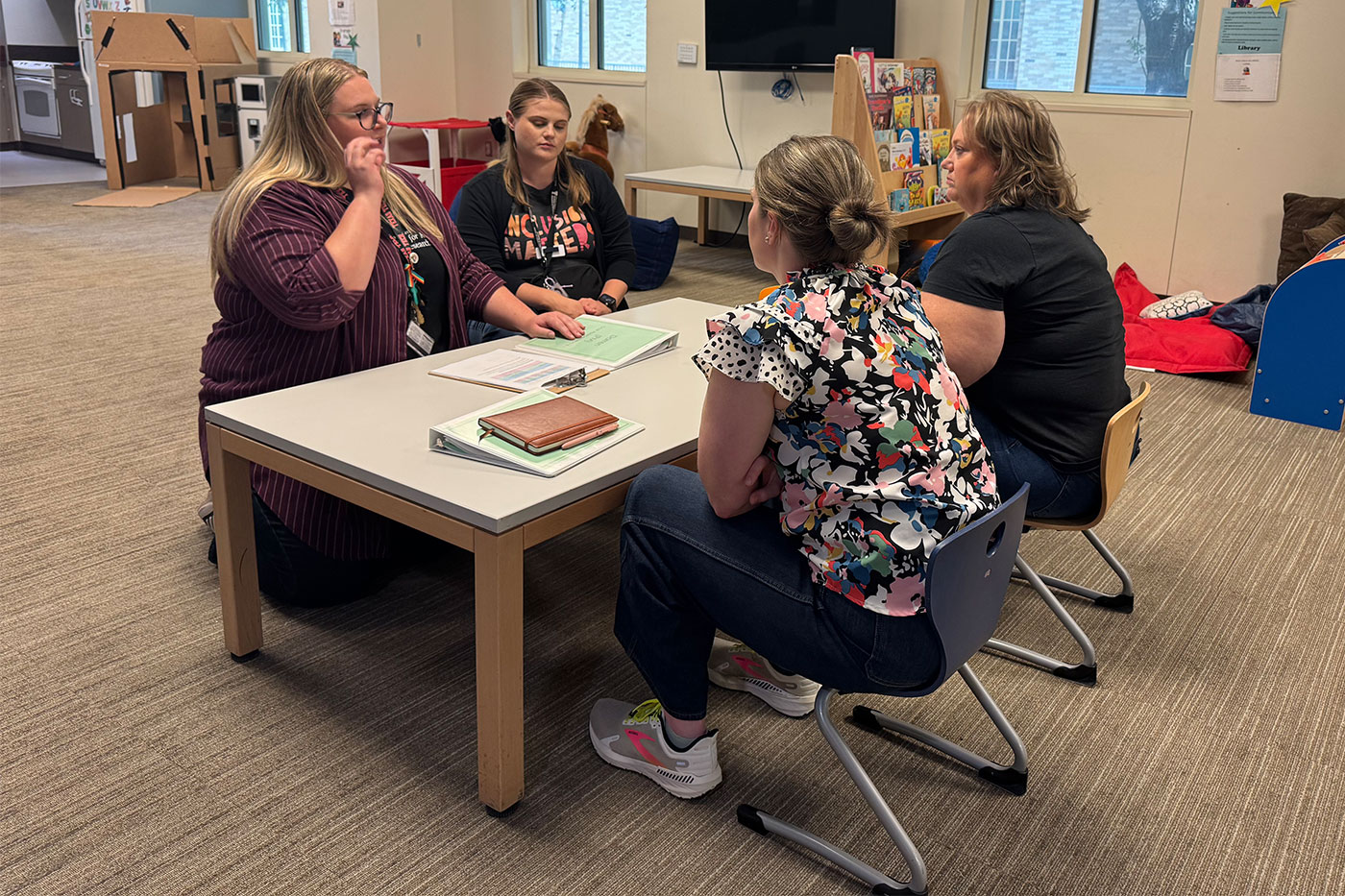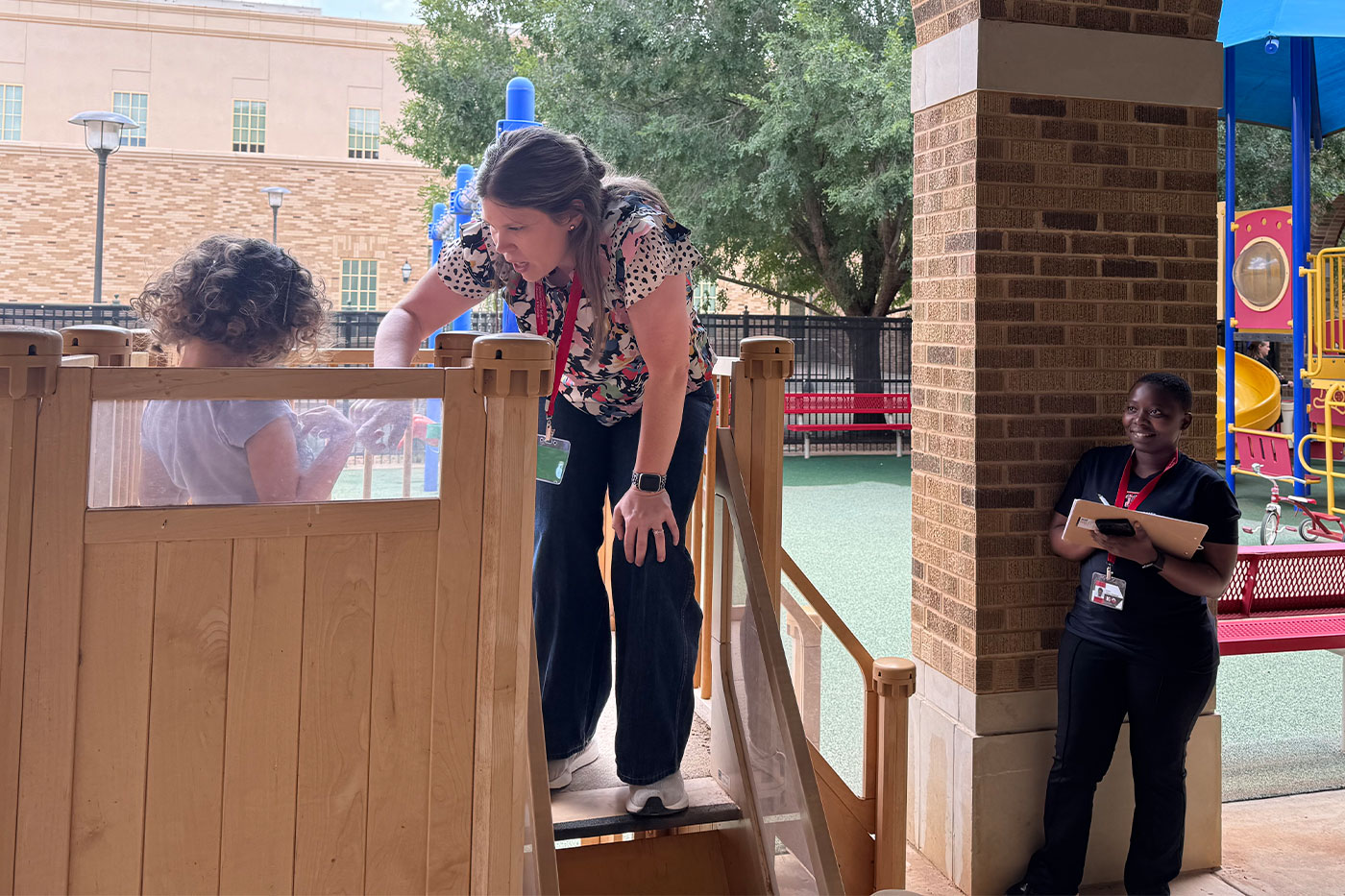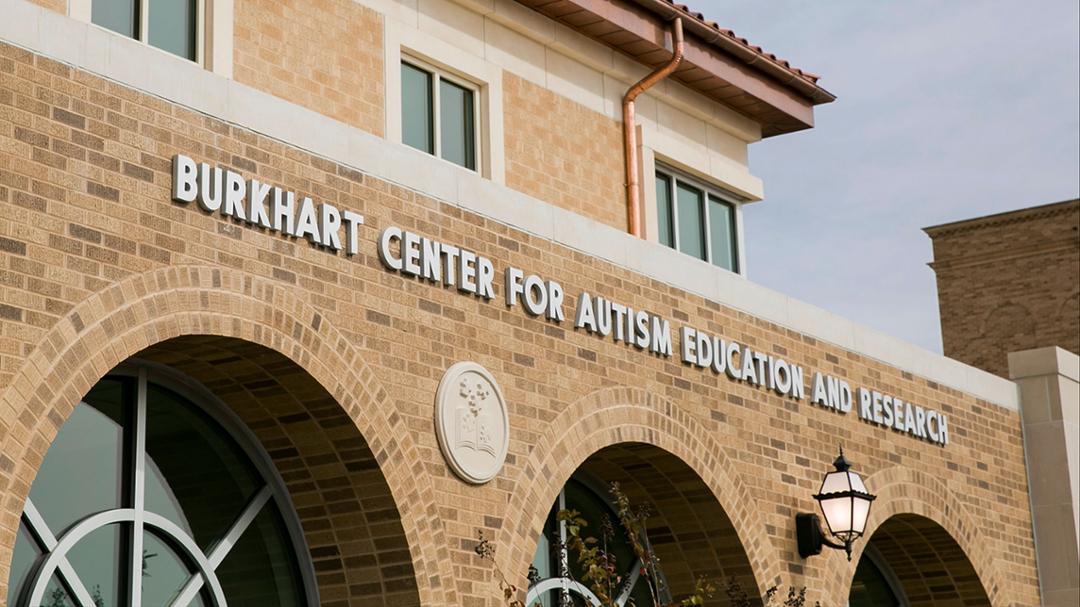The Burkhart Center for Autism Education & Research hosted a summer seminar for teachers to learn communication methods to improve interaction with students.
The room is bright with child-sized play structures and colorful carpet made to withstand daily use by active youngsters. In another area are toys – or maybe educational items disguised as such. A young student animatedly runs from a woman trying to engage in conversation. Another woman with a clipboard looks on, noting behaviors of both the youngster and the adult.

The scene is typical of the weeklong communication skills “camp,” hosted by Texas Tech University’s Burkhart Center for Autism Education & Research for area special education teachers. The event is one of the ways the center fulfills its namesakes’ prime objective, to help teachers better teach and communicate with special-needs students.
The center’s benefactors, Jim and Jere Lynn Burkhart, have made that goal clear since the opening of the facility in 2005.
“I never imagined it would grow to the extent it has,” Jere Lynn said in a previous interview. “When it started out, I just wanted to be able to train teachers to know what an autistic child is like, but the secret to our success has been the good people who have been involved. I didn't envision this. I didn't envision a building. I just wanted maybe a program in the College of Education to help teachers. So, it's far exceeded that.”
Jennifer Hamrick, Jere Lynn Burkhart Regents Professor & Director of the Burkhart Center and Applied Behavior Analysis program coordinator, ensures that goal is met by hosting opportunities like the summer communications skills training. The focus is showing special education teachers how to teach functional language to children in classroom settings.

“We have teachers from across West Texas attend as well as children from surrounding areas with limited language skills,” Hamrick explained. “The teachers have a chance to practice the skills and get feedback in the moment from Burkhart faculty and research assistants.”
Hamrick glances around the room, narrating the various activities. The ones who have clipboards are initially taking down data on the teacher interaction with the students. They are graduate students or staff at Burkhart who have been trained in all the techniques. After five minutes of data collection, they go in and provide some direct coaching and feedback.

There is a 20-minute rotation through different rooms and areas in the building. The staff stay in the same rooms, and the teachers rotate, so they're getting feedback in different locations with different activities in three different areas.
“The teachers are from all over, and this one over here is from Plainview,” Hamrick says, pointing out one of the adults in the room. “It's a really unique situation. She's here, and her mother is also a special education teacher – they're both here. They drive in from Plainview each day. We have another teacher who is from the north side of Amarillo at River Road ISD. Her district is paying for her to stay here this week so she can attend the training.”
Another camp practice is pairing teachers with kids who are similar in age to the classrooms they're in at their school settings. Or instead, leaders ensure students the teachers are working with have similar characteristics to one or ones at their school, which makes it easier to take those new skills back to the classroom.

Lisa Stone is a special education teacher at Brown Elementary in Lubbock. She is also the parent of an autistic teen. She cannot put a price on the skills she learned while participating in the summer training.
“Working with real students in real time while the graduate students observed allowed them to provide me, in detail, the strengths and weaknesses they saw for a specific technique,” Stone said. “As the camp went on, I was able to hone and practice specific skills. I plan on applying several different strategies on day one when students return to school.”
The camp is also an opportunity for the young students to come in and work on basic language skills and behavior.
One child who attended is the 7-year-old son of Jessica Cervantez – who is also a Red Raider, graduating in 2004 with a bachelor’s from what is now Human Development & Family Sciences. She and her son have been involved with the Burkhart Center since he was 4. He has been diagnosed with autism spectrum disorder, has speech delay and other behavioral needs.
Pre-camp planning includes a parent meeting with the therapist, recording parent-child interaction and collecting other data. Toward the end of the Friday session, the parents come for the last hour and watch from behind a two-way mirror. Hamrick or another faculty member talk through what they’re seeing and what a parent or guardian could potentially do at home.
Cervantez says this training is vital for classroom teachers to hone communication skills, but as a parent, it’s priceless. In any child with autism, communication is one of the huge barriers, and every child is different.

“You're dealing with nonverbal, semi-verbal, or in our case, our son is verbal, but he speaks a lot in repetitive words,” Cervantez said. “Conversational speech is not something we have.
“A lot of behaviors are because he cannot communicate to us. So, to have a camp that is 100% focused on helping him communicate is huge for a parent because that's all we want. We need to know, ‘What do you want? What do you need?’ And that helps our days go smoothly. Honestly, the first time we did the communication camp, it was just eye-opening to see a whole team of people that are here to help you with your biggest struggle.”
Whether for the teachers, parents or students, Hamrick says there is different monetary support for each of the pieces of the camp. The parent training component is paid through a grant from the Texas Higher Education Coordinating Board so the center can provide that service to the families. The training is also offered online via telehealth.
Participating teachers are paid a stipend since it’s time out of their summer – the only extended vacation they have. That money comes out of the center’s general funds for excellence and also provides teachers with materials to take back to their classrooms.
With autism affecting one in 31 children in the U.S., according to the Centers for Disease Control and Prevention (CDC), Hamrick believes it is imperative teachers at all grade levels know more about teaching and interacting with these youth and those with other learning differences.
“The big thing is, if you're interested in donating and helping parents and teachers access free opportunities, free trainings or even us paying teachers to be able to come to this, you can just donate to the general funds for excellence that's on the Burkhart Center page,” Hamrick said.
As a teacher and an involved parent, Stone feels much better-equipped, having taken advantage of the opportunity. As a parent to an autistic teen, she says she will use the skills learned at camp at home with her son and possibly share some of the information with his teachers.
“I am very thankful for this camp and have suggested to many of my coworkers to attend the camp next year if available,” Stone said, with a sigh of gratitude.
And parents like Cervantez receive so much more than a week’s worth of sessions. Her son gets to go to camp.

“He doesn't have any other camps he qualifies for because of his behavioral needs. This is our only camp for the year,” Cervantez said, almost tearfully. “So, to him, it's huge. He sees the fun and exciting, ‘I just to get to go play in this place I love,’ but a parent sees the play is all about learning communication.
“What you learn at the communications camp goes far beyond that one week. We can't put a value on what this means as parents to get the education offered at the Burkhart Center.”

